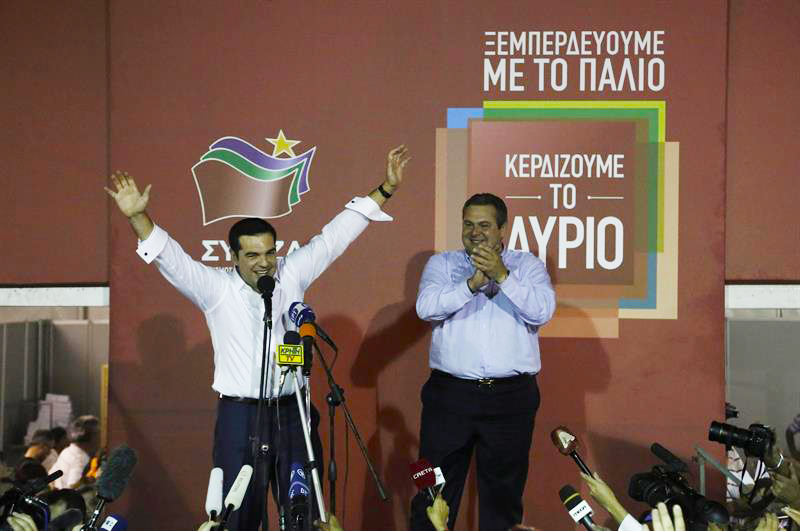This article was based on the previously-published article from La Izquierda Diario: Syriza y Anel vuelven al gobierno para aplicar el tercer memorándum
The Syriza-Anel coalition won 155 seats in the 300-member parliament, followed by New Democracy with 28.3 percent or 75 seats, and the neo-nazi Golden Dawn with 7 percent or 18 seats. Abstention was particularly high. About 54 percent of Greeks took part in the election, compared to the 63 percent last January, in a country with a traditionally high voter turnout.
Syriza will lead the same coalition that governed for the last eight months and approved the third memorandum, which included new austerity measures and privatizations. Tsipras resigned last month, forcing this last election.
Expectations
Final polls before the elections predicted a tight race with no clear winners between Syriza and the conservative New Democracy (ND). Many expected voters to punish Tsipras for accepting the Troika proposals and the third memorandum.
Until Sunday’s elections, 13 percent of voters were undecided. Many of them had voted for Syriza last January. They voted for Tsipras again, but this time there were no illusions or euphoria. Syriza simply became the “lesser evil,” in the face of the possibility of New Democracy’s return to government.
Although Syriza has lost support (to its left and its right), it ended up losing just four seats in Parliament. This is a minor cost, considering the transformations and capitulations of Syriza since it took office last February.
Far from the promised “anti-austerity government,” Syriza has become the “third memorandum” government, accepting one by one the demands of the European Union. These last eight months saw Tsipras’ agreement with the Troika, which included privatizations of Greek ports, airports, and companies while deepening cuts to public funds and social programs.
The EU Greets a New “Solid” Government
European Parliament’s president, Martin Schulz, greeted Tsipras’ victory and added, “Now a solid government ready to deliver is needed quickly.” Syriza also received congratulations from Eurogroup President, Jeroen Dijsselbloem, who assured they were “ready to work closely with the Greek authorities and to continue accompanying Greece in its ambitious reform efforts.” Thus, the European establishment is asking Tsipras to hurry the implementation of austerity measures included in the third bailout.
By forcing this new election, Tsipras aimed for renewed backing from the Greek people after he accepted the Troika bailout. Having lost the parliament majority, due to the Left Platform split (today Popular Unity), Syriza-Anel needed to recover it.
Popular Unity, the Biggest Loser
The new party, Popular Unity (PU) did not reach the minimum required to win parliamentary seats. This result represented a huge setback for the Panagiotis Lafazanis’ party (leader of former Syriza’s Left Platform) When they left Syriza, a month ago, they held 25 seats.
Popular Unity was unable to win support from voters. Forming part of the Syriza-Anel government, they did not represent an alternative to its policies. PU’s rhetoric and perspective have been reduced to recovering the “spirit” of Syriza. But in fact, they continue to be part of the government, releasing testimonial critic resolutions in Syriza’s Central Committee, and at the same time, approving the government’s policies within Parliament.
Like Syriza, the PU favors occupying institutional space over encouraging the independent mobilization of workers and the youth. Also, PU’s strategy for a “Grexit” aimed at the “reconstruction of the national economy” is perceived by many as the path to economic catastrophe, poverty, and unemployment.
A Working-Class, Anti-Capitalist Alternative
To Syriza’s left, the Stalinist KKE (Communist Party) holds nearly 12 seats (keeping 5,4% of the votes, as obtained in the last election). Adding to their strong influence within the labor unions (through their union organization PAME), they represent a substantial political force inside and outside Parliament.
The main problem with KKE is its sectarian and self-centered program, and its refusal to build a united resistance within the workers’ movement and unions. This reluctance has been a major obstacle to mobilizing against the government’s austerity measures and European imperialism.
The anti-capitalist left coalition (ANTARSYA + EEK) won only 0.83 percent of the vote. Their results showed a small gain from January elections, but they failed to reach the minimum required to access parliamentary seats. A great part of ANTARSYA rejected joining Popular Unity and their class-collaboration “anti-Euro”, holding an independent policy. They took part in the election with a united left independent ballot: neither with Syriza, nor with PU and the KKE. However, within the coalition, many differences remain.
The Syriza-Anel coalition has “renewed” its credentials in the last election. Austerity measures will be applied as part of the third memorandum. No matter the electoral support, it is unlikely that Tsipras’ government will not face resistance from workers and unions.
The reorganization of the working class and fighting sectors that are independent of the government in order to resist Troika’s new austerity measures presents an urgent task. It is necessary to defend an anticapitalist program and build a strong anticapitalist, revolutionary left, based on class struggle which is strongly represented in all major workplaces and among the militant youth.











